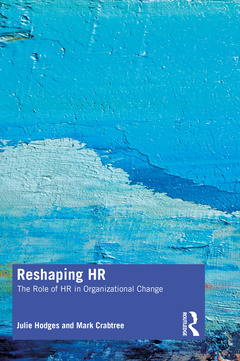Reshaping HR The Role of HR in Organizational Change

The aim of this book is to explore the contribution HR can make to how organizations enact change within the context of an environment of increasing complexity driven by global forces for change. In particular the book focuses on the role of HR in creating value for organizations and engaging stakeholders during transformations.
This aim is achieved in several distinct ways. First, a critical perspective is provided of the role of HR in organizational change by examining evidence-based theories, models and frameworks. Second, the book is grounded in empirical evidence from a study conducted by the authors amongst managers and HR professionals across the globe. This provides unique data on the challenges and opportunities which the practice of HR faces within the context of organizational change. Third, consideration is given as to how HR can play an active and constructive role in co-creating sustainable change with managers, employees and other stakeholders. Fourth, the book identifies the capabilities required by HR professionals in order to engage effectively with organizational change. Finally, aware of the dangers of prescriptive lists, the HR practices offered in this book are provided as a basis for amendment, as necessary, by readers depending upon the context of individual organizations.
The book will be of value to practising HR professionals as well as students studying HRM and change and development in organizations. Our proposal in this book is that since people are of significant importance to the success of change, and HR knowledge and expertise is vital to the experience and engagement of individuals and teams, internal and external to the organization, there needs to be clarity about the role of HR in transformations. We suggest that HR?s raison d?être is to focus on the people aspect of organizational change and that this needs to be done within the context of improving organizational effectiveness and wellbeing.
Part 1: The Context 1. Introduction – the essence of HR2. Forces that are transforming work3. Theoretical perspectives of organizational change Part 2: Changing 4. Evolution of HRM 5. Creating Meaningful change Part 3: Connecting 6. Collaboration7. Worker Well-being 8. Changing Elements of the Culture Part 4: Capabilities 9. Growing and leveraging capabilities for change10. Conclusion: The reshaping of HR
Julie Hodges, Professor, is a leading expert on change in organizations, particularly the role and impact of people during transformations. Before entering the academic world Julie worked as a business consultant for over 20 years in several profit and non-profit organizations. She is the author of several books including Organization Development: How Organizations Change and Develop Effectively; Employee Engagement for Organizational Change; Consultancy, Organizational Development and Change; Managing and Leading People through Change; and Sustaining Change in Organizations. Julie is a Principal Fellow of the Higher Education Academy, Senior Fellow of the Foundation for Management Education (FME) and Academic Fellow of ICMCI (International Council of Management Consulting Institute).
Mark Crabtree has over 30 years’ experience of leading the development, management, implementation and delivery/facilitation of engaging learning and organization development strategies and initiatives. Before starting his own consultancy in 2019, Mark held senior HR and OD positions in the UK Higher Education Sector, Private Sector and Local Government.
Date de parution : 12-2020
15.6x23.4 cm
Date de parution : 12-2020
15.6x23.4 cm
Thèmes de Reshaping HR :
Mots-clés :
HRD; HR; Hr Work; HRM; Hr Practice; Organizational change; CIO; Change Management; SME; Organizational Transformations; Hr Leader; Role of HR; Hr Function; Organization Development; Hr Consultant; People management; Business Case; Evidence-based theories; Transactional Hr Activity; Hr Business Partner; HR practices; non-HR Managers; Business Partner Role; Hr Manager; Effective Hr Practice; Hr Governance; Hr’s Evolution; Hr’s Strategic Role; Job Crafting; SME Company; Hr Structure; Black Elephants; Hr Metric; Ball Room; Hr Practitioner



